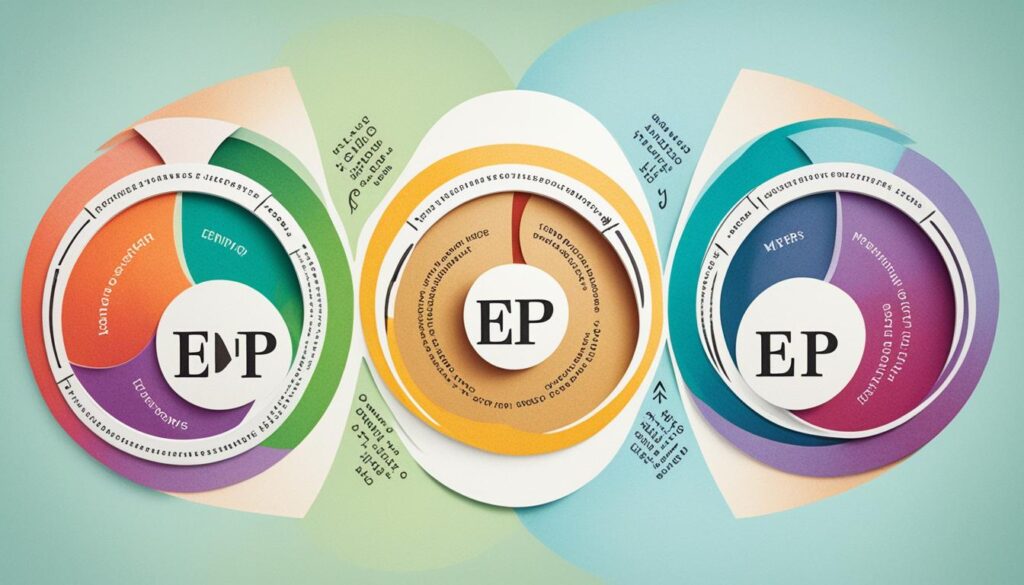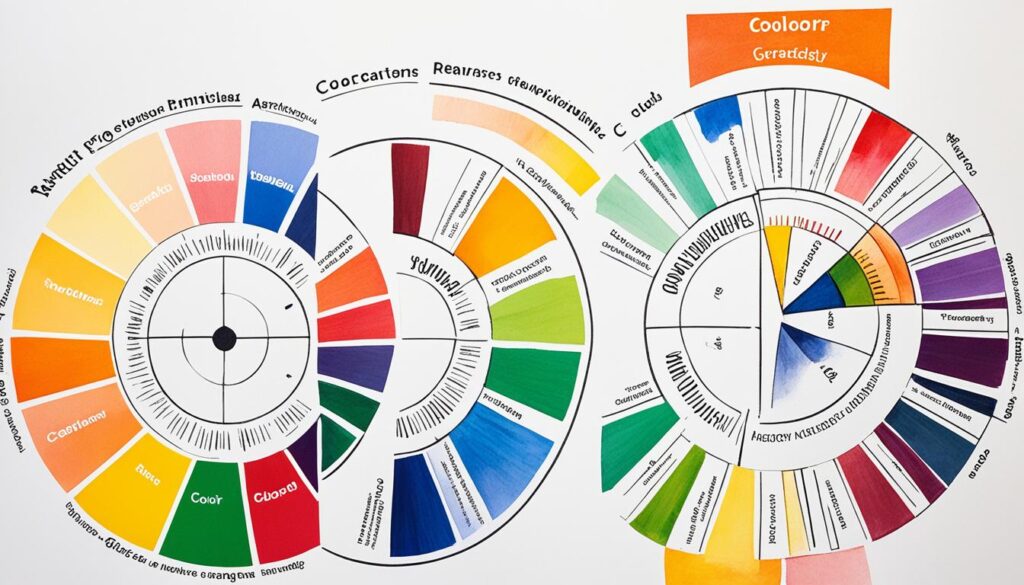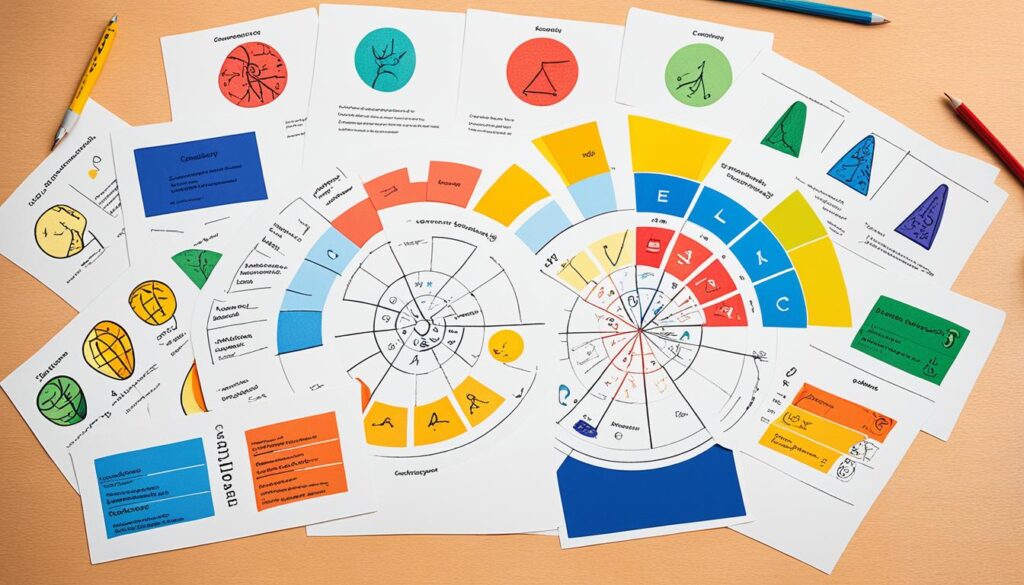Did you realize that personality assessments are more than just a trend, they are valuable resources for self-discovery and growth in both personal and professional spheres? A recent study revealed that 85% of Fortune 500 companies incorporate personality tests into their recruitment procedures! The significance and prevalence of personality testing in psychology cannot be denied, as people strive to gain insight into their own characteristics and behaviors.
Key Takeaways:
- Personality tests provide valuable insights for self-awareness and personal and professional development.
- Commonly used personality tests include the Myers-Briggs Type Indicator (MBTI®), Big Five Personality Test, DISC Assessment, and Enneagram Personality Test.
- Choosing the right personality test depends on individual objectives and the specific aspects of personality they wish to explore.
- Personality tests have limitations, including subjectivity and biases, and should not replace professional mental health services.
- Self-improvement is an ongoing journey, and personality tests can be a helpful guide along the way.
The Myers-Briggs Type Indicator (MBTI®)
The Myers-Briggs Type Indicator (MBTI®) is a widely used and recognized personality assessment that provides valuable insights into individual preferences and behaviors. Developed by Isabel Briggs Myers and her mother, Katharine Briggs, based on the work of renowned psychologist Carl Jung, the MBTI® categorizes individuals into one of 16 distinct personality types.
Using four dichotomies, the MBTI® measures preferences for:
- Introversion (I) vs. Extraversion (E) – how individuals gain energy and focus their attention
- Sensing (S) vs. iNtuition (N) – how individuals perceive and gather information
- Thinking (T) vs. Feeling (F) – how individuals make decisions and prioritize values
- Judging (J) vs. Perceiving (P) – how individuals approach and organize their external lives
By understanding their MBTI® type, individuals can gain deeper insights into their natural preferences and tendencies, which can contribute to a greater understanding of their strengths, weaknesses, and how they interact with others in various contexts.
Here is an overview of the 16 personality types defined by the MBTI®:
| MBTI® Type | Description |
|---|---|
| ISTJ | Introverted, Sensing, Thinking, Judging |
| ISFJ | Introverted, Sensing, Feeling, Judging |
| INFJ | Introverted, iNtuition, Feeling, Judging |
| INTJ | Introverted, iNtuition, Thinking, Judging |
| ISTP | Introverted, Sensing, Thinking, Perceiving |
| ISFP | Introverted, Sensing, Feeling, Perceiving |
| INFP | Introverted, iNtuition, Feeling, Perceiving |
| INTP | Introverted, iNtuition, Thinking, Perceiving |
| ESTP | Extraverted, Sensing, Thinking, Perceiving |
| ESFP | Extraverted, Sensing, Feeling, Perceiving |
| ENFP | Extraverted, iNtuition, Feeling, Perceiving |
| ENTP | Extraverted, iNtuition, Thinking, Perceiving |
| ESTJ | Extraverted, Sensing, Thinking, Judging |
| ESFJ | Extraverted, Sensing, Feeling, Judging |
| ENFJ | Extraverted, iNtuition, Feeling, Judging |
| ENTJ | Extraverted, iNtuition, Thinking, Judging |
The MBTI® provides a comprehensive framework for understanding personality dynamics and can be a valuable tool for personal growth, career development, and building effective relationships.

Big Five Personality Test
The Big Five Personality Test is a widely accepted psychometric assessment that measures personality along five dimensions: Openness to Experience, Conscientiousness, Extraversion, Agreeableness, and Neuroticism. Instead of providing types, the test provides trait profiles based on the individual’s responses. The Big Five provides insights into how personalities differ and why, and it is used to understand individual differences in behavior and emotions.
The Big Five Personality Test is a powerful tool for both personal and professional growth. By assessing key personality dimensions, individuals can gain a deeper understanding of themselves and others. Each dimension represents a distinct aspect of personality:
- Openness to Experience: This dimension measures a person’s openness to new ideas, experiences, and perspectives. Individuals who score high on this dimension tend to be imaginative, curious, and creative.
- Conscientiousness: Conscientious individuals are organized, responsible, and diligent. They demonstrate self-discipline and are focused on achieving their goals.
- Extraversion: Extraverts are outgoing, energetic, and sociable. They thrive in social settings and enjoy being around others.
- Agreeableness: Agreeable individuals are warm, compassionate, and cooperative. They value harmony and prioritize the needs of others.
- Neuroticism: Neuroticism reflects emotional stability. Individuals who score high on this dimension may experience higher levels of anxiety, stress, and mood swings.
The Big Five Personality Test provides a comprehensive assessment of an individual’s personality, allowing them to gain valuable insights and self-awareness. Understanding these dimensions can help individuals navigate relationships, make career choices, and enhance personal development.

As researchers continue to explore personality dimensions and how they influence behavior, the Big Five Personality Test stands as a reliable and valid tool in the field of psychology. Its comprehensive framework provides individuals with a deeper understanding of themselves, allowing for personal growth and improved self-awareness.
DISC Personality Test
The DISC Assessment is a valuable tool for understanding behavior and communication style. It measures these aspects based on two axes: task focus/people focus and action focus. By identifying where individuals fall on these axes, the assessment determines their DISC personality type. The four DISC personality types include Drive, Influence, Support, and Clarity.
Each personality type is characterized by unique strengths, weaknesses, and motivations. Those with a Drive personality type are task-focused and action-oriented, often taking charge and setting high standards. Individuals with an Influence personality type are people-focused and charismatic, excelling in interpersonal relationships and persuasion. Support personality types prioritize collaboration, empathy, and creating harmony in their environments. Lastly, individuals with a Clarity personality type value structure, organization, and clear communication.
The DISC Assessment helps individuals gain insights into their communication style and behavior, enabling them to leverage their strengths and improve upon their weaknesses. By understanding their own DISC personality type, individuals can enhance their interpersonal skills, navigate team dynamics more effectively, and make informed decisions about their career paths. The assessment also provides valuable guidance for personal development, enabling individuals to develop self-awareness and refine their communication strategies.
The Four DISC Personality Types
| Personality Type | Description |
|---|---|
| Drive | Task-focused and action-oriented individuals who excel at taking charge and setting high standards. |
| Influence | People-focused and charismatic individuals who excel in interpersonal relationships and persuasion. |
| Support | Collaborative and empathetic individuals who prioritize harmony and teamwork. |
| Clarity | Structured and organized individuals who value clear communication and attention to detail. |
By embracing the insights gained from the DISC Assessment, individuals can improve their communication, collaboration, and overall effectiveness in various aspects of their personal and professional lives.

Enneagram Personality Test
The Enneagram is a personality system that categorizes individuals into nine distinct types. Each type has its own unique set of core motivations, fears, strengths, blind spots, and opportunities for personal growth. This test is widely used in coaching and counseling to delve deeper into an individual’s values, motivations, and behaviors, promoting holistic personal growth.
The Enneagram provides a comprehensive understanding of personality by exploring the internal driving forces that shape behavior and decision-making. By identifying their Enneagram type, individuals can gain greater emotional intelligence, self-awareness, and insight into the motivations and fears that influence their actions.
Key aspects of the Enneagram:
- Identifies nine distinct types of personality
- Reveals core motivations that drive behavior
- Highlights individual fears and areas of potential growth
- Sheds light on personal strengths and blind spots
By understanding their Enneagram type, individuals can embark on a journey of personal growth and self-improvement. The Enneagram offers a roadmap to navigate blind spots and develop strengths, enabling individuals to enhance their relationships, make more informed decisions, and cultivate a greater sense of purpose and fulfillment.
“The Enneagram empowers individuals to embark on a journey of self-discovery, leading to personal growth, meaningful relationships, and enhanced self-awareness.”

| Type | Motivations | Fears | Strengths | Blind Spots |
|---|---|---|---|---|
| Type 1: The Perfectionist | Striving for perfection, doing what is right | Fear of making mistakes, criticism, and chaos | High ethical standards, self-discipline, attention to detail | Tendency towards self-criticism, rigidity, and judgment |
| Type 2: The Helper | Desire to be loved and needed, caring for others | Fear of rejection, being unappreciated | Empathy, compassion, nurturing nature | Tendency to be overly involved, neglecting own needs |
| Type 3: The Achiever | Drive for success, desire for recognition | Fear of failure, being unimportant | Ambition, adaptability, self-confidence | Tendency to prioritize image and external validation |
| Type 4: The Individualist | Need for self-expression, longing for uniqueness | Fear of being ordinary, misunderstood | Creativity, depth of emotions, authenticity | Tendency towards melancholy, self-absorption |
| Type 5: The Investigator | Thirst for knowledge, need for privacy | Fear of depletion, intrusion | Intellectual curiosity, independence, observation skills | Tendency towards isolation, detachment |
| Type 6: The Loyalist | Seeking security, loyalty to others | Fear of uncertainty, being without support | Loyalty, preparedness, skepticism | Tendency towards anxiety, indecisiveness |
| Type 7: The Enthusiast | Craving for variety, pleasure, and freedom | Fear of being trapped, experiencing emotional pain | Optimism, spontaneity, versatility | Tendency towards escapism, avoiding pain |
| Type 8: The Challenger | Desire for control, assertiveness | Fear of being controlled, vulnerability | Leadership, resilience, self-confidence | Tendency towards aggression, controlling behavior |
| Type 9: The Peacemaker | Need for harmony, avoiding conflict | Fear of separation, conflict, and loss | Empathy, calmness, mediation skills | Tendency towards complacency, passive-aggressiveness |
Understanding the Enneagram types can unveil deep insights into personality, fostering personal growth and transformation. By recognizing our core motivations, fears, strengths, and blind spots, we can embark on a journey of self-discovery and emerge as more self-aware and compassionate individuals.
Other Popular Personality Tests
In addition to the commonly used personality tests, there are other assessments available for self-discovery and self-understanding. These tests provide additional insights and understanding of oneself, offering different perspectives on personality traits and behaviors.
Color Personality Test
The Color Personality Test is a popular assessment that categorizes individuals into four color-coded results based on temperaments. Each color represents different personality traits and characteristics. This test helps individuals gain insights into their preferences, strengths, and areas for growth. Discovering your color personality can enhance self-awareness and improve relationships with others.
True Colors Personality Test®
The True Colors Personality Test® is another widely recognized assessment that classifies individuals into different personality types. This test is based on the concept of four primary personality colors: Blue, Gold, Green, and Orange. Each color represents unique characteristics and communication styles. By understanding your True Colors, you can better comprehend your motivations, values, and how you relate to others.
Toxic Person Test
The Toxic Person Test is designed to identify personality traits that may impact your ability to get along with others. This assessment helps individuals recognize certain toxic behaviors or traits that they may possess or encounter in others. Understanding these traits can enable individuals to navigate relationships more effectively and develop strategies for managing toxic dynamics.
These additional personality tests offer valuable insights and perspectives on self-discovery, self-understanding, and relationship management. Utilizing a combination of assessments can provide a comprehensive understanding of oneself and promote personal growth.

The Downsides of Personality Testing
Personality testing, while valuable in many ways, is not without its downsides. It is important to acknowledge and understand the limitations of these tests to make informed decisions about their use and interpretation.
One of the main concerns with personality testing is subjectivity. Since most tests rely on self-reporting, the results can be influenced by the test-taker’s own insights, motivations, and even the context in which the test is taken. This subjectivity introduces the possibility of bias, as individuals may consciously or unconsciously present themselves in a certain light or answer questions in a way that aligns with their desired outcomes.
Moreover, ethical considerations come into play when using personality tests, particularly in professional settings. The results should be treated with sensitivity and caution, as they can have a significant impact on hiring decisions and individuals’ career prospects. It is crucial to use these tests for coaching and development purposes, rather than as the sole determinant for employment or promotion.
It is also important to note that personality tests should not be seen as a replacement for professional mental health services. These tests provide insights into one’s personality traits, preferences, and tendencies, but they are not capable of diagnosing or addressing mental health conditions. Individuals should seek the guidance of trained professionals when dealing with psychological or emotional issues.
“Personality testing provides valuable insights, but it is not a definitive measure of an individual’s character or capabilities. It is essential to take the results with a grain of salt and use them as a tool for self-reflection and growth.”
By recognizing the subjectivity, bias, and ethical considerations that come with personality testing, we can navigate this tool with care and use it in a way that enhances self-awareness and personal development. Understanding the limitations of these tests allows us to appreciate their benefits while also seeking other resources when it comes to mental health and well-being.

Choosing the Right Personality Test
The choice of the right personality test depends on your individual objectives and what you want to learn about yourself. Different tests measure and interpret specific aspects of your personality, providing valuable insights into different dimensions of who you are. To ensure you find the best personality test for your needs, it’s important to evaluate the various options available and select the one that aligns with your goals.
To help you make an informed decision, consider the following factors:
- Your objectives: Determine what you hope to achieve through the personality test. Are you looking for self-awareness, career guidance, relationship insights, or personal growth?
- Specific aspects of personality: Consider the aspects of your personality that are most important to you. Do you want to explore your communication style, values, motivations, or strengths?
- Evidence-based assessments: Look for personality tests that have a solid scientific foundation and are backed by reputable research.
- Validity and reliability: Assess the validity and reliability of the test. Validity refers to how well the test measures what it claims to measure, while reliability refers to the consistency of the results.
- User-friendly interface: Choose a test that is easy to navigate and understand. A user-friendly interface will help ensure a positive testing experience.
- Reviews and recommendations: Read reviews and seek recommendations from trusted sources, such as professionals in the field or individuals who have taken the test before.
Remember, the best personality test is the one that provides meaningful insights and helps you understand yourself better. By choosing the right test, you can embark on a journey of self-discovery and personal growth.

Comparison of Personality Test Features
| Personality Test | Main Focus | Number of Types | Key Features |
|---|---|---|---|
| MBTI® | Preferences and Interaction Style | 16 | Provides insights into how you prefer to process information, make decisions, and interact with others. |
| Big Five | Personality Dimensions | 5 | Measures openness, conscientiousness, extraversion, agreeableness, and neuroticism to describe your personality. |
| DISC | Behavior and Communication Style | 4 | Evaluates your task-oriented vs. people-oriented approach and the level of assertiveness and emotional response. |
| Enneagram | Core Motivations and Growth Opportunities | 9 | Explores your motivations, fears, strengths, and blind spots, providing a roadmap for personal growth. |
What Are Personality Assessments in Psychology?
Personality assessments in psychology are valuable techniques used to measure and evaluate an individual’s traits and patterns of behavior. These assessments provide insights into various aspects of an individual’s personality and behavior, helping to gain a deeper understanding of oneself and others.
Assessing Traits and Patterns
Personality assessments are designed to assess and categorize different traits and patterns in an individual’s personality. These assessments aim to identify characteristics such as introversion or extraversion, thinking or feeling preferences, and other personality dimensions that contribute to an individual’s unique personality profile.
Self-Report Inventories
Self-report inventories are a common type of personality assessment. In self-report inventories, individuals are presented with statements or questions about themselves and are asked to rate the extent to which they agree or disagree. These inventories provide valuable information about an individual’s self-perceptions and can uncover important insights into their personality traits and tendencies.
Projective Tests
Projective tests are another type of personality assessment that requires individuals to interpret abstract or vague objects, images, or scenarios. By analyzing an individual’s responses and interpretations, trained professionals can gain insights into their unconscious thoughts, motivations, and personality traits. Projective tests can provide a deeper understanding of an individual’s hidden emotions and perceptions.
Interviews
Interviews are a widely used method of personality assessment. During interviews, trained professionals ask individuals a series of probing questions to delve into their thoughts, feelings, and behaviors. The responses offered during interviews help reveal important aspects of an individual’s personality, such as their communication style, interpersonal skills, and emotional intelligence.
Personality assessments, including self-report inventories, projective tests, and interviews, are utilized in various settings, such as clinical psychology, workplaces, and forensic psychology. These assessments offer valuable insights into an individual’s personality traits and behaviors and assist in making informed decisions regarding personal development, career choices, and therapeutic interventions.

Conclusion
Personality tests offer valuable insights into self-discovery and understanding. They enable individuals to identify their strengths, weaknesses, and preferences, gaining a deeper understanding of how they interact with others. Despite the limitations of subjectivity, biases, and ethical considerations, personality tests have the potential to foster personal and professional development.
The benefits of self-discovery through personality testing are immense. By uncovering our unique traits and tendencies, we gain self-awareness that can guide our choices and actions. Understanding our personality can enhance our relationships, improve communication, and even open doors to new opportunities.
It is important to acknowledge the limitations of personality testing. Subjectivity and biases may influence the results, and caution should be exercised in interpreting and utilizing the findings. Personality tests are not infallible and should never replace professional mental health services.
Ultimately, self-improvement is an ongoing journey. Personality tests serve as valuable tools for continuous growth and self-awareness. By utilizing the insights gained from these tests, we can cultivate our strengths, address our weaknesses, and strive for personal and professional excellence.
How Do Different Personality Tests in Psychology Impact Job Applications?
Many employers recognize the importance of personality tests in the hiring process. These tests can provide valuable insights into a candidate’s behavior, preferences, and work style, helping employers make more informed decisions. By incorporating various personality tests into the job application process, employers can better assess a candidate’s fit for a particular role.
FAQ
What are personality tests?
Personality tests are techniques used to measure and evaluate an individual’s traits and patterns of behavior.
Why are personality tests valuable?
Personality tests are valuable tools for gaining self-awareness and understanding oneself better. They can help identify strengths, weaknesses, values, motivations, and interests.
What are some commonly used personality tests?
Some commonly used and respected personality tests include the Myers-Briggs Type Indicator (MBTI®), Big Five Personality Test, DISC Assessment, and Enneagram Personality Test.
How does the MBTI® work?
The MBTI® measures personality preferences based on four dichotomies: Introversion/Extraversion, Sensing/iNtuition, Thinking/Feeling, and Judging/Perceiving. Individuals are categorized into one of 16 personality types.
What does the Big Five Personality Test measure?
The Big Five Personality Test measures personality along five dimensions: Openness to Experience, Conscientiousness, Extraversion, Agreeableness, and Neuroticism. It provides insights into individual differences in behavior and emotions.
What does the DISC Assessment measure?
The DISC Assessment measures behavior and communication style based on task focus/people focus and action focus. It categorizes individuals into the Drive, Influence, Support, or Clarity personality types.
What is the Enneagram Personality Test?
The Enneagram is a personality system with nine types, each with its own core motivations, fears, strengths, blind spots, and opportunities for personal growth.
Are there other personality tests available?
Yes, there are other assessments available, such as the Color Personality Test and the Toxic Person Test, which provide additional insights and understanding of oneself.
What are the downsides of personality testing?
The downsides of personality testing include subjectivity, biases in self-reporting, and ethical considerations in professional settings. Personality tests should not replace professional mental health services.
How do I choose the right personality test?
The choice of the right personality test depends on your objectives and what you want to learn about yourself. It’s important to evaluate the various tests available and decide which one aligns with your goals.
What are personality assessments in psychology?
Personality assessments in psychology are techniques used to measure and evaluate an individual’s traits and patterns of behavior. They can be self-report inventories, projective tests, or interviews.









